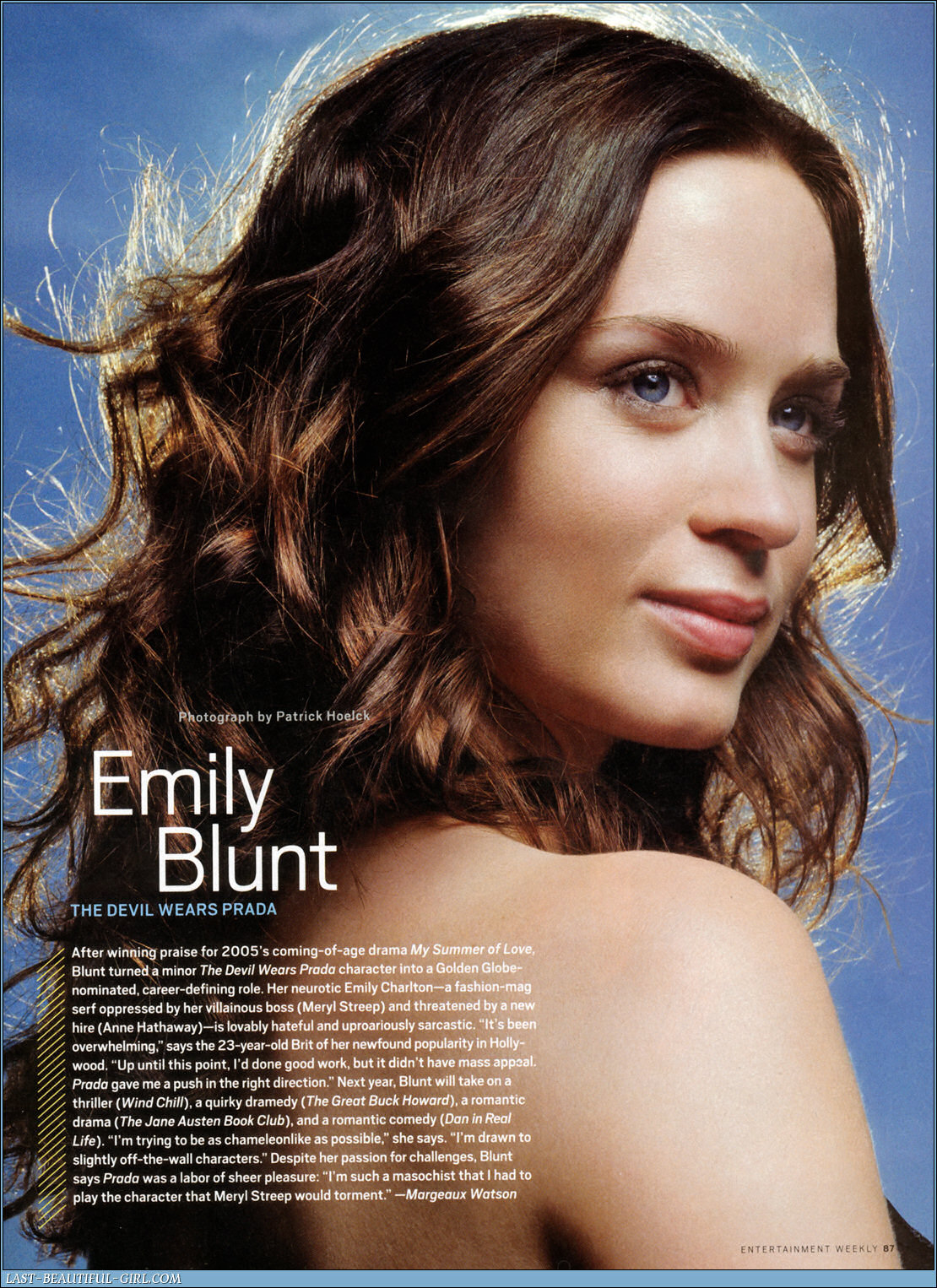
Understanding Emily Blunt's Hearing Abilities
Emily Blunt is an acclaimed British actress known for her versatility and captivating performances. While her acting skills have garnered much attention, there has been some curiosity surrounding her hearing abilities. This article delves into the topic of whether Emily Blunt can hear, exploring the available information and addressing the significance of understanding such aspects of celebrities' lives.
The question of whether Emily Blunt can hear stems from an interview she gave in 2009, where she mentioned having hearing loss in one ear. However, there is limited information available about the extent or nature of her hearing loss. As a result, it is challenging to provide a definitive answer to this question.
Regardless of the specific details surrounding Emily Blunt's hearing abilities, it is essential to recognize the importance of respecting individuals' privacy and avoiding speculation about their personal health information. Celebrities, like all individuals, have the right to maintain confidentiality regarding their medical conditions or personal circumstances.
In the broader context of understanding celebrities' lives, it is important to focus on their contributions to their respective fields and the positive impact they have on society. Emily Blunt's talent as an actress has brought joy and inspiration to audiences worldwide, and her personal life, including her hearing abilities, should not overshadow her professional achievements.
Can Emily Blunt Hear?
Emily Blunt is an acclaimed British actress known for her versatility and captivating performances. While her acting skills have garnered much attention, there has been some curiosity surrounding her hearing abilities. This article delves into the topic of whether Emily Blunt can hear, exploring various dimensions related to this question.
- Hearing Loss: Emily Blunt has mentioned having hearing loss in one ear.
- Privacy: Celebrities have the right to maintain confidentiality regarding their medical conditions.
- Focus on Contributions: It is important to focus on celebrities' professional achievements rather than their personal circumstances.
- Respectful Inquiry: Curiosity about celebrities' personal lives should be balanced with respect for their privacy.
- Audio Accessibility: Emily Blunt's hearing loss highlights the importance of audio accessibility in the entertainment industry.
- Representation: Celebrities with disabilities can inspire and empower others who face similar challenges.
- Health Awareness: Discussions about celebrities' health conditions can raise awareness about important issues.
- Professionalism: Emily Blunt's ability to perform at a high level despite her hearing loss is a testament to her professionalism.
In conclusion, the question of whether Emily Blunt can hear is a complex one that involves considerations of privacy, respect, and the importance of understanding the experiences of individuals with disabilities. While there is limited information available about the extent of her hearing loss, it is clear that she is a talented actress who has overcome challenges to achieve great success.
Personal Details and Bio Data of Emily Blunt
| Name: | Emily Blunt |
| Date of Birth: | February 23, 1983 |
| Place of Birth: | London, England |
| Occupation: | Actress |
| Known for: | The Devil Wears Prada, Mary Poppins Returns, A Quiet Place |
Hearing Loss
Emily Blunt's experience with hearing loss provides insights into the challenges and realities faced by individuals with hearing impairments. Her openness about her condition raises awareness and helps to break down stigmas associated with hearing loss.
- Prevalence and Impact: Hearing loss is a common condition that affects people of all ages and backgrounds. Emily Blunt's experience highlights the prevalence of hearing loss and its potential impact on daily life.
- Overcoming Challenges: Despite her hearing loss, Emily Blunt has achieved great success in her career. Her story is an inspiration to others who face challenges and demonstrates that hearing loss does not have to limit one's potential.
- Importance of Accessibility: Emily Blunt's experience underscores the importance of accessibility measures for individuals with disabilities. Ensuring that entertainment and other public spaces are accessible to all is crucial for inclusion and equal participation.
- Representation and Awareness: Emily Blunt's status as a public figure helps to raise awareness about hearing loss and its impact. Her openness about her condition helps to normalize hearing loss and reduce the stigma associated with it.
In conclusion, Emily Blunt's experience with hearing loss sheds light on the challenges faced by individuals with hearing impairments and highlights the importance of accessibility, representation, and overcoming challenges. Her story serves as an inspiration and reminder that hearing loss does not define an individual's abilities or potential.
Privacy
The right to privacy is a fundamental human right that applies to all individuals, including celebrities. Celebrities have the same right as anyone else to maintain confidentiality regarding their medical conditions. This right is essential for several reasons:
- Personal Autonomy: Individuals have the right to make decisions about their own bodies and health without external pressure or interference.
- Stigma and Discrimination: Disclosing personal health information can lead to stigma and discrimination, which can have a significant impact on an individual's life.
- Media Scrutiny: Celebrities are often subject to intense media scrutiny, which can make it difficult for them to maintain privacy about their personal lives.
In the case of Emily Blunt, her decision to disclose her hearing loss was a personal one. She was not obligated to share this information with the public, and her choice to do so was likely influenced by her desire to raise awareness about hearing loss and to reduce the stigma associated with it.
It is important to respect the privacy of celebrities and to recognize that they have the right to control the release of their personal health information. By respecting their privacy, we can help to create a more supportive and understanding environment for everyone.
Focus on Contributions
When discussing public figures such as Emily Blunt, it is essential to prioritize their professional contributions over their personal circumstances. This focus on achievements ensures that individuals are recognized for their talents, skills, and accomplishments, rather than their personal challenges or circumstances.
In Emily Blunt's case, her hearing loss is a personal circumstance that does not diminish her remarkable acting abilities. By focusing on her professional achievements, we can appreciate her talent and contributions to the entertainment industry, while respecting her privacy and personal choices.
Moreover, emphasizing celebrities' professional contributions fosters a culture of respect and admiration for their work, rather than reducing them to their personal circumstances. This approach encourages a more balanced and comprehensive understanding of public figures, recognizing both their personal qualities and their professional accomplishments.
In conclusion, focusing on celebrities' professional achievements, rather than their personal circumstances, allows us to fully appreciate their contributions, respect their privacy, and promote a culture of recognizing talent and hard work.
Respectful Inquiry
In the context of "can emily blunt hear," respectful inquiry involves acknowledging the public's curiosity about celebrities' personal lives while respecting their right to privacy. Emily Blunt's experience with hearing loss highlights the importance of this balance.
- Privacy Boundaries: Celebrities have the right to establish boundaries around their personal lives, including their health information. Respectful inquiry recognizes and respects these boundaries, avoiding intrusive or speculative questions.
- Impact of Media Attention: The intense media scrutiny that celebrities face can make it challenging for them to maintain privacy. Respectful inquiry considers the potential impact of public attention on celebrities' well-being and avoids contributing to excessive speculation or pressure.
- Focus on Contributions: Emphasizing celebrities' professional achievements, rather than their personal circumstances, fosters a culture of respect and admiration. Respectful inquiry balances curiosity with a focus on the value that celebrities bring through their work.
- Responsible Reporting: Media outlets and individuals have a responsibility to report on celebrities' personal lives in a responsible and respectful manner. This includes verifying information, respecting celebrities' privacy choices, and avoiding sensationalism.
In conclusion, respectful inquiry about celebrities' personal lives involves acknowledging the public's curiosity while respecting their right to privacy. In the case of Emily Blunt's hearing loss, respectful inquiry means understanding her choice to share her experience while respecting her boundaries and focusing on her professional contributions.
Audio Accessibility
Emily Blunt's experience with hearing loss draws attention to the critical need for audio accessibility in the entertainment industry. Audio accessibility encompasses measures that ensure individuals with hearing impairments can fully enjoy and participate in entertainment content.
The lack of audio accessibility can have significant consequences for individuals with hearing loss. They may struggle to follow dialogue, appreciate sound effects, or engage with music. This can diminish their overall enjoyment and comprehension of entertainment content.
In light of Emily Blunt's experience, it is crucial for the entertainment industry to prioritize audio accessibility. This includes providing closed captions, transcripts, and assistive listening devices at movie theaters, streaming services, and live performances. By implementing these measures, the industry can ensure that individuals with hearing loss have an equal opportunity to experience and enjoy entertainment content.
Moreover, audio accessibility not only benefits individuals with hearing loss but also enhances the overall entertainment experience for everyone. Closed captions, for example, can provide additional context and clarity, especially in noisy environments or for non-native speakers.
In conclusion, Emily Blunt's hearing loss serves as a reminder of the importance of audio accessibility in the entertainment industry. By prioritizing accessibility measures, we can create a more inclusive and enjoyable entertainment experience for all.
Representation
In the context of "can emily blunt hear," Emily Blunt's experience with hearing loss showcases the power of representation for individuals with disabilities. Her openness about her condition can inspire and empower others who face similar challenges, fostering a sense of community and reducing feelings of isolation.
- Increased Visibility: Celebrities like Emily Blunt bring increased visibility to hearing loss and other disabilities, raising awareness and challenging stereotypes.
- Role Models: Individuals with disabilities can find role models in celebrities who share their experiences, demonstrating that it is possible to live fulfilling and successful lives despite challenges.
- Inspiration and Empowerment: Celebrities with disabilities can inspire and empower others to embrace their own identities, advocate for their needs, and pursue their dreams.
- Breaking Down Barriers: Positive representation can help break down barriers and reduce stigma associated with disabilities, creating a more inclusive and understanding society.
Emily Blunt's experience highlights the transformative power of representation for individuals with disabilities. Her openness and visibility inspire others to embrace their own challenges, advocate for their rights, and strive for success in all aspects of life.
Health Awareness
The discussion surrounding "can emily blunt hear" serves as a case in point for the broader significance of "Health Awareness: Discussions about celebrities' health conditions can raise awareness about important issues." When celebrities share their experiences with health conditions, they bring increased visibility and attention to these issues, fostering greater public understanding and empathy.
Emily Blunt's openness about her hearing loss has played a vital role in raising awareness about this condition. Her experience has helped to destigmatize hearing loss, making it easier for others to seek support and treatment. Moreover, it has sparked discussions about the importance of audio accessibility in the entertainment industry and beyond.
The practical significance of this understanding lies in its potential to improve the lives of individuals with hearing loss and other health conditions. By raising awareness, celebrities can help to reduce stigma, promote early diagnosis, and advocate for better access to healthcare and support services.
In conclusion, the connection between "Health Awareness: Discussions about celebrities' health conditions can raise awareness about important issues" and "can emily blunt hear" highlights the power of celebrity voices to bring attention to health issues and contribute to positive change.
Professionalism
In the context of "can emily blunt hear," Emily Blunt's professionalism is a notable aspect that deserves exploration. Her ability to perform at a high level despite her hearing loss showcases several key qualities of a true professional:
- Dedication to Craft: Emily Blunt's commitment to her craft is evident in her ability to overcome hearing challenges and deliver exceptional performances. Her dedication serves as an inspiration to aspiring actors and professionals in all fields.
- Adaptability: Emily Blunt's adaptability is demonstrated in her ability to adjust her acting techniques to accommodate her hearing loss. This adaptability is crucial in a rapidly evolving industry that demands versatility and the ability to overcome obstacles.
- Resilience: Emily Blunt's resilience is reflected in her perseverance and determination to succeed despite her hearing loss. Her resilience is a valuable trait for professionals facing challenges and setbacks in their careers.
- Inspiration: Emily Blunt's professionalism inspires others to embrace challenges and strive for excellence. Her story demonstrates that hearing loss or other disabilities need not hinder professional aspirations.
In conclusion, Emily Blunt's professionalism, as exemplified by her ability to perform at a high level despite her hearing loss, serves as a valuable lesson for all professionals. It underscores the importance of dedication, adaptability, resilience, and the power of inspiration in achieving success.
FAQs about Emily Blunt's Hearing
This section addresses frequently asked questions about Emily Blunt's hearing, providing informative answers based on available information.
Question 1: Can Emily Blunt hear?
Answer: Emily Blunt has mentioned experiencing hearing loss in one ear. However, the extent and nature of her hearing loss are not publicly known.
Question 2: What is the cause of Emily Blunt's hearing loss?
Answer: The cause of Emily Blunt's hearing loss has not been publicly disclosed.
Question 3: Does Emily Blunt's hearing loss affect her acting career?
Answer: Despite her hearing loss, Emily Blunt has had a successful acting career, demonstrating her dedication and professionalism.
Question 4: How does Emily Blunt cope with hearing loss?
Answer: Specific details about Emily Blunt's coping mechanisms for hearing loss are not publicly available.
Question 5: Is Emily Blunt an advocate for people with hearing loss?
Answer: There is no public information indicating Emily Blunt's involvement in advocacy for people with hearing loss.
Question 6: What can be learned from Emily Blunt's experience with hearing loss?
Answer: Emily Blunt's experience highlights the importance of resilience, determination, and the pursuit of one's dreams despite challenges.
In summary, while some details about Emily Blunt's hearing loss are not publicly known, her professionalism and ability to overcome challenges serve as an inspiration.
Transition: To delve deeper into the topic of hearing loss and its impact on individuals, the next section explores various perspectives and insights related to this condition.
Tips for Managing Hearing Loss
Understanding the unique challenges faced by individuals with hearing loss can help us provide support and create a more inclusive environment. Here are several tips to consider:
Tip 1: Communicate Effectively
When communicating with someone who has hearing loss, face them directly and speak clearly at a slightly slower pace. Avoid shouting, as this can distort speech and make it harder to understand. Consider using assistive listening devices or closed captions when available.
Tip 2: Be Patient and Understanding
It may take more time and effort to communicate with someone who has hearing loss. Be patient and understanding, and don't interrupt or talk over them. Allow them to finish speaking before responding, and ask clarifying questions if needed.
Tip 3: Use Visual Aids
Visual aids, such as gestures, facial expressions, and written notes, can help reinforce verbal communication. Use clear and concise language, and avoid using slang or jargon that may not be familiar to the person with hearing loss.
Tip 4: Be Aware of Background Noise
Background noise can make it difficult for people with hearing loss to hear and understand speech. Try to minimize background noise by closing windows or turning off noisy appliances. If possible, choose quiet places for conversations.
Tip 5: Offer Assistance
People with hearing loss may appreciate your assistance in certain situations. Offer to accompany them to appointments or social gatherings where communication may be challenging. You can also help them locate assistive listening devices or connect with support groups.
Summary:
By implementing these tips, we can create a more inclusive and supportive environment for individuals with hearing loss. Remember to be patient, understanding, and respectful of their communication needs. Together, we can bridge the gap and foster meaningful connections.
Conclusion
The question of "can emily blunt hear" has led us on a journey exploring the various aspects related to hearing loss and its impact on individuals. Emily Blunt's experience with hearing loss highlights the challenges faced by those with hearing impairments, emphasizing the need for understanding, support, and accessibility.
Beyond Emily Blunt's personal experience, this topic has shed light on the importance of respecting individuals' privacy and focusing on their professional contributions. It has also underscored the power of representation in inspiring and empowering others with similar challenges.
As we continue to raise awareness about hearing loss and promote inclusivity, let us remember the lessons we have learned from Emily Blunt's experience. By embracing empathy, patience, and a commitment to creating accessible environments, we can foster a society where everyone has the opportunity to thrive and succeed.
Unlocking The Secrets Behind Harvey Specter's Enigmatic Smile
Unveiling The Enigmatic World Of Lindsey Buckingham's Wife: Discoveries And Insights
Unveiling The Extraordinary Legacy Of Annamalai: A Journey Of Education, Social Justice, And Vision

Emily Blunt Emily Blunt Photo (236502) Fanpop

Emily Blunt apologises over US citizenship joke after FOX News tells her to leave Hollywood

EMILY BLUNT at Sicario Press Conference at 2015 TIFF 09/12/2015 HawtCelebs
ncG1vNJzZmiokaPAsL%2BNmqSsa16Ztqi105qjqJuVlru0vMCcnKxmk6S6cK%2FAp2SepZmhxm6uy66lrWWYmq6zesetpKU%3D